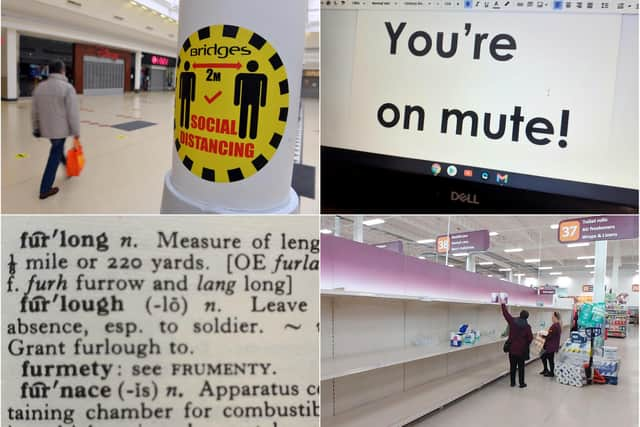The top 10 phrases of 2020, when everything we did was ‘better than nothing’
and live on Freeview channel 276
The year 2020 brought neologisms that in some cases made no sense whatsoever 12 months ago: all of them are to do with the pandemic. The words “lockdown”, “social distancing”, “covidiots” and “covid” itself leap to mind.
The virus has done more for our our vocabulary than it has for... well, most things, really.
Advertisement
Hide AdAdvertisement
Hide AdWords which already existed have been brought to the fore. “Furlough” from the Dutch word “verlof” meaning leave of absence, has been around for centuries. But before 2020 it was a relatively obscure term used mainly in military circles.


Anyone else using it would have been mocked for faux-poshness. Now we all say it. So covid has, to be fair, extended everyone’s vocabulary by at least one word.
A two-word expression which great swathes of people were unfamiliar with, particularly in the south of England, is one they will now never forget due to its timeless comedy associations. We refer of course to “Barnard Castle”, which turned out to be a real place, complete with an actual medieval castle and several opticians.
Although it has no business being in a dictionary, the abomination that is “staycation” is another pre-existing “word” which came to prominence; although the best people never use it. Those who do seem to consider a holiday in Scotland or Cornwall as the epitome of self-sacrifice.
Advertisement
Hide AdAdvertisement
Hide AdLanguage changes. Even a previously unremarkable phrase like “Happy New Year” used with customary glibness each January, might best be used sparingly and cautiously in 2021, considering how 2020 turned out.
But here are the top 10 phrases and expressions of the past year. The list, pop pickers, is based on exhaustive and scientifically advanced data gathering techniques: ie. we say so.
10. “What are they going to do with all that toilet roll?”
The literal answer to that question is not one we care to dwell upon. However, back in March and April we were allowed to wonder.
The great lavatory paper rush of the spring has not so far been repeated; possibly because certain people have only recently seen their television screens for the first time in months, having been previously unable to watch Coronation Street past the Himalayan piles of Andrex.
Advertisement
Hide AdAdvertisement
Hide AdCuriously, we are yet to hear anyone admit to stockpiling toilet rolls in March. It was done entirely by other people, not people like us who, public-spiritedly, only spent about 40 quid on them.
9. “You’re on mute!”
“Zoom” in its latest context is only a new-ish word. It already existed before 2020, but lockdown accelerated its use spectacularly.
Most people using Zoom had not done so before last spring and could be somewhat fingers and thumbs when using it: and especially prone to inadvertently silencing themselves. Hence “You’re on mute!”
Whether or not to tell someone they have self-muted is a very modern quandary. Its resolution depends very much upon how boring or irritating someone is.
8. “Can you get a refund?”
Far from a new phrase, but now more prevalent than ever.
7. “Stay safe everyone.”
Advertisement
Hide AdAdvertisement
Hide AdA nice sentiment, but ludicrously redundant as suggestion. The implication is that without this thuddingly obvious piece of advice, we might fill our leisure time by licking used cutlery, seeking out the company of people with productive coughs and gargling leftover lager.
6. “Have you got your mask?”
Self-explanatory. Nevertheless, in the recent past anyone walking in to an off-licence with their face covered risked immediate arrest. Now the reverse is more likely to reply.
A related 2020 observation is: “Why bother wearing one if it doesn’t cover your nose?”
5. “I’m not sure if I fancy another quiz.”
They were fun at the start. Indeed, Zoom quizzes were the most excitement many people had in early lockdown. The main reason for this was not so much the quizzes themselves, but the chance to catch up with particular family and friends you might not have seen in a long while.
Advertisement
Hide AdAdvertisement
Hide AdBut that was before you remembered why you hadn’t seen particular family and friends in a long while.
4. “Bubble up”
This is another phrase which bore no meaning until 2020. If anyone had said it before now it might have conjured up images of squirting too much Matey under a hot tap. Either that or something positively disgusting.
3. “What have you missed most in 2020?”
A late entry in the list, but it has been in considerable use in the last couple of weeks; mainly by people who compile those silly “Top 10” lists which make their way into newspapers in such abundance each December.
But what did we miss most in 2020? Easy. It was 2019.
2. “I’ve done my own research.”
This is a social media favourite, along with the related exhortation: “Do your own research!”
Advertisement
Hide AdAdvertisement
Hide AdAlas, it transpires that “researching” and “Googling” are not interchangeable terms; something that real experts, carrying out real research will confirm. Sharing YouTube clips posted by unqualified attention seekers does not count as a Newton-and-the-apple moment.
1. “Better than nothing”
“Well we’d planned a fortnight in Acapulco, but in the end we just had an afternoon in Witherwack. Better than nothing.”
The description applies to much of our leisure activity in 2020. Meeting family via phones and computers only? Better than nothing. Football on a laptop rather than in a stadium? Better than nothing.
Exchanging inane comments with your mates on WhatsApp, rather than exchanging inane comments with your mates in the pub? Better than nothing.
Advertisement
Hide AdAdvertisement
Hide AdWill everything in 2021 be better than nothing? Most of us would probably settle for it being better than 2020.
